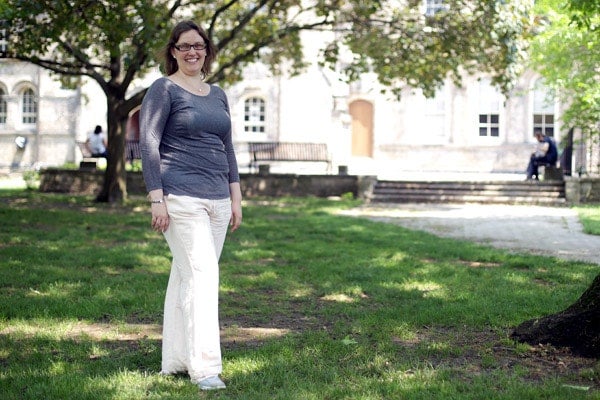
How to learn English faster and with less stress
Published: June 5, 2013
With an eye to developing globally oriented thinkers and innovators, the W. Garfield Weston Doctoral Fellowship Program provides 16 Canadian graduate students from the University of Toronto with a travel award of $50,000.
The award will further their research, broaden their skills and expand their networks in an international setting.
Available to Canadian students across all fields—the humanities, as well as the social, physical and life sciences—The Weston Fellowship is Canada’s only fully-funded award program dedicated to international research at the doctoral level. A Weston Fellowship will cover a year’s tuition, the expenses of international travel, a living stipend, and travel within the destination country for U of T students who are entering the third or fourth year of their doctoral program, and plan to do research outside of Canada.
Computer Science doctoral student Carrie Demmans Epp is one of the 16 U of T students receiving a Weston Fellowship this year. (Read about Weston Fellow Shaun Cleaver.) U of T News asked Demmans Epp to reflect on what the award means for her research.
Tell us a bit about your work.
My work involves exploring the use of mobile phone applications. I look at how we can use these apps to help improve the lives of recent immigrants and other learners of English. I am hoping that the app that I am building will help English language learners communicate with the people that they meet in their everyday lives. The app is designed to help these people communicate with those around them, but it is also designed to help them learn English words so that they can communicate independently.
One of the things that makes this app different from many of the other language learning apps that are on the market is that it supports communication and it adjusts the learning materials that it gives to people based on what they know, where they are, and what they are doing.
What drew you to this field – and to this focus in particular?
I became interested in computer science when I took a computer science course in high school. I really liked how there was always a problem to be solved or something that could be made better. I was also very lucky because computer science made sense to me even though it was challenging. I decided to go to university to become a programmer since I knew I could get a good job after finishing school.
There wasn’t a specific moment when I became interested in language learning. It was one of those things that was kind of always with me. My parents put me in French immersion starting in Kindergarten and I took a Russian course out of interest in first year university. I wound up liking the course so much that I decided to do a double honours in Russian and Computer Science. This was great because it allowed me to do a term of school in St. Petersburg where I got to see how people who aren’t fluent in a language cope with being in an environment where that is the only way that they can communicate with those around them. It also helped me better understand what that felt like since I also struggled to communicate with those around me even though I had spent 3 years studying the language at university. I still can’t imagine how hard it must be for many of the people who move to Canada when they don’t know English.
What drew you to U of T?
I chose the U of T because of the international reputation of its researchers and because it has the best graduate program in computer science in Canada. I also decided to come here because I was interested in the work that Professor Ronald Baecker was doing in his lab. He is working on problems that matter to real people, which fit well with how I am motivated. I need to know that someone will directly benefit from my work.
What does the Weston Fellowship mean to you?
The Weston fellowship is giving me the opportunity to expand my research. It will allow me to validate my work in different contexts and help make sure that the app that I am building is beneficial to English language learners regardless of their background. Studying the use of my app in Japan and being able to compare that to its use in Canada will give me a better understanding of the challenges that English language learners face. It will also help me to better understand how I can help them.
The Weston fellowship will also help me meet my goal of working with Dr. Susan Bull. She is a world leader in adaptive educational technology and language learning and I have been trying to find a way to fund a trip to work with her since the summer of 2011. This fellowship means that I can finally go and benefit from her experience in this area.

